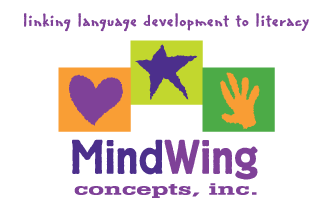Secure Checkout. FREE SHIPPING for Continental U.S. Orders over $60.
Menu
-
- Home
-
About Us
-
The Approach
-
Linking Language & Literacy
-
Professional Learning
-
Learning Resources
-
SHOP
-
Blog
-
- About MindWing
- Our People
- Contact Us
- Your Account
- Login
-
United States (USD $)

Secure Checkout. FREE SHIPPING for Continental U.S. Orders over $60.
Tech Tuesday/Summer Study Series: Listening on Assessments
by Sean Sweeney August 03, 2023 3 min read

“Flashlight” Wordless Book by Lizi Boyd
As many narratives could tell us (think of Shirley Jackson’s “The Lottery” as an extreme example), just because something “has always been done this way” does not mean it shouldn’t be questioned. This month we’ll turn that concept into thinking about standardized tests, too-long THE determining factor in whether students do or do not receive speech and language interventions, particularly in the public school setting.
Without inserting my POV too much into this topic, let’s keep the Summer Study Series focus and take a look at the recent review article published in Language, Speech and Hearing Services in Schools, A Critical Analysis of Standardized Testing in Speech and Language Therapy (Nair, Farah & Cushing, 2023):
- The authors recount the history of speech and language intervention as dating back to the Middle Ages, with recognition of speech disabilities and efforts to remediate seen in cultures such as ancient India. The first and second World Wars were noted as landmark moments in which techniques were formulated for improving function after injuries led to acquired speech, language, and hearing disorders. Critical to the perspective of the article, the authors discuss disability in the context of colonialism and capitalism such that people with disabilities, including those related to communication, or “speaking well,” have been either exploited or included in society based on their capacity for “economic production.”
- The notion of establishing disability has been closely connected to the history of racism in society, with disabled people of color subsequently being oppressed for both race and disability. Standardized testing in communication disorders was established with a strong connection to White European norms in cognition and language, and therefore, have historically been applied with a tendency toward oppressive practices: “This is done through labeling minoritized children as Standard English learners through standardized testing and in need of remediation to appropriate their language to White norms.”
- In current and more specific terms, the authors describe a consistent effort (including historically legal actions like the “No Child Left Behind” Act) to “remove education from the local and community interests and place it under the preview of federal laws and global economy.” This extends to the aftermath of the COVID-19 pandemic and constant reports of “learning loss,” which may be functionally so, but are favorite reports of corporations who produce standardized tests. The review cites PBS research demonstrating that there are only four major companies that control standardized testing, including Pearson, certainly an influence in our field.
- The authors assert further that the content of standardized testing seeks to uphold uniformity and “standard” or “proper” language according to norms based in European cultures and colonialism. They are therefore a tool of white supremacy, the results having enormous negative impacts: “The students will internalize the oppression in the classroom and in the wider society, and they develop attitudes that are not conducive to their socio-emotional growth.”
- Looking forward, the authors sought not to provide alternatives to standardized testing, but rather ask clinicians to think critically about these tools and offer some reflection and resistance as much as is possible, given our positions. Reflective questions are provided such as “What does a practice that subverts from standardized testing and resists racism look like to you?”
Overall, this article would certainly give any clinician a lot to think about and provides an important opportunity to listen to diverse perspectives. From my position of privilege, I don’t offer easy solutions either, but the reflective question above makes me consider a few features of anti-racist practice, some incorporating, as always, the possibilities of technology:
- School-based assessments should be following the legal guidelines of IDEA and not relying solely on standardized tests. It’s very frequent that I come across school reports that use standardized tests as the only procedure to determine eligibility. See Whitmire’s (2002) article for a full discussion of this issue.
- Story Grammar Marker® and its assessment tools such as the Developmental Sequence can certainly be a part of the solution in providing assessments and intervention that acknowledge diversity. Besides being a functional tool from which one can base criteria grounded in community- and school-based norms, SGM® provides in its manual considerations of cultural and linguistic differences in narrative language. For additional information on these variations, see Westby & Murphy’s excellent presentation.
- Besides wordless picture books being themselves a potential diversity-friendly means of obtaining language assessment data, simple online research can guide you to using picture books that provide representation of varied races, cultures and themes.
Sean Sweeney
Sean Sweeney, MS, MEd, CCC-SLP, is a speech-language pathologist and technology specialist working in private practice at the Ely Center in Needham, MA, and as a clinical supervisor at Boston University. He consults with local and national organizations on technology integration in speech and language interventions. His blog, SpeechTechie (www.speechtechie.com), looks at technology “through a language lens.” Contact him at sean@speechtechie.com.
Leave a comment.
Comments will be approved before showing up.
